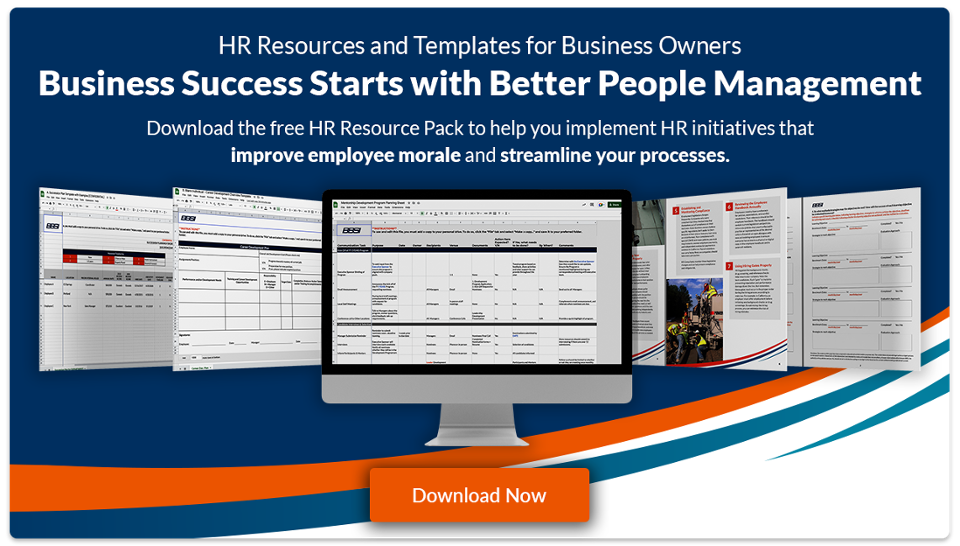
Guide to Hiring Out-of-State Employees and Compliance Laws
With the normalization of remote work, hiring out-of-state employees has always been challenging.
Geographically diverse employees can bring many benefits to your company, from specialized skill sets to a broader reach for your business. It also, however, presents unique challenges for business owners to navigate. That’s because every state has different laws and regulations regarding hiring, taxes, payroll, benefits, and more.
In this guide, we’ll break down common compliance laws that vary from state to state. We’ll also explain how you can streamline compliance by partnering with BBSI.
Benefits of Hiring Out-of-State Employees
Depending on your industry, there are many compelling reasons to search for employees who live beyond the borders of your state. Some of these reasons include:
- Access to a larger talent pool: When you’re not limited to the confines of your state, you can consider a much vaster pool of candidates. Some of these candidates may be the perfect match for your open positions.
- Specialized expertise: Some out-of-state candidates may have specialized skill sets, perspectives, and backgrounds to benefit your business. By hiring out-of-state employees, you can bring this expertise to your company, regardless of geography.
- Enhanced remote work offerings: Nearly 33 million Americans are expected to work remotely by 2025 — around 22% of the American workforce. Remote job applicants often live in other states. By preparing for out-of-state compliance ahead of time, you can onboard these remote workers more efficiently.
- Increased uptime with different time zones: American workdays occur across seven different time zones. By hiring out-of-state employees, you can expand your company’s uptime to encompass several of these time zones. In some cases, this may help you expand your company’s reach to new markets.
- More competitive wages: Due to different costs of living and minimum wage requirements, wages can vary quite notably from one state to the next. For example, California residents often require much higher wages than their Kentucky-based counterparts. By expanding your employee search to more states, you may be able to fill your roles with more cost-effective candidates.
- Employee retention: Some of your top workers may eventually move out of state for personal reasons, whether that’s to live closer to family or to enjoy more affordable housing. If you have the legal infrastructure to support out-of-state employees, these individuals can continue working for your company post-move, improving employee retention.
As you can see, having an out-of-state remote work policy in place can open up many opportunities for your company. But, before you can enjoy these advantages, you must equip your business to operate legally in each state where you plan to hire.
Preparing for Hiring Out-of-State Employees
Every state has unique nuances when it comes to hiring rules and regulations. Thus, you want to familiarize yourself with these laws before posting job listings for out-of-state positions. For instance, you may need to:
- Hire a registered agent: Many state agencies can only send business documents to physical addresses within their states. You can hire a registered agent if you don’t have an office in the new state. A registered agent is someone who accepts mail on your company’s behalf.
- Get all of your required licenses, permits, and certifications: From ‘Doing Business As’ (DBA) registrations to health permits and occupational licenses, there’s a lot of paperwork you must fill out to legally operate in new states.
Since state laws differ in regard to these requirements, compliance can be complicated. That’s where BBSI can lend a helping hand — we can prepare your company to hire out-of-state workers so you’re in compliance from the get-go.
Out-Of-State Tax Requirements
Even if you only do business in one state, taxes can be tedious and time-consuming. Add additional state taxes into the mix, and your compliance obligations can increase considerably.
For instance, some states require you to register for an income tax withholding account. Others may only necessitate that you set up a State Tax ID Number or sales tax license.
In addition to income taxes, every state has its own unemployment tax program, which can affect your business, employer, and employee contributions. Likewise, states can vary regarding their workers’ compensation tax rates and coverage.

Out-Of-State Hiring Requirements
After taxes, the next area to review is your hiring process. Job applications must comply with all relevant federal, state, and local laws. You must also follow each state’s law when it comes to:
- Background checks
- Application questions about criminal histories
- Reference checks
- Drug tests
Certain states may have rules regarding which job positions can use these screening tools, when to request them during the hiring process, and who must pay associated fees. Some states also have additional legal requirements for child labor, immigration, and public records.
If this sounds like a lot to keep up with, you don’t have to do it alone — BBSI can guide you through all the steps involved in hiring out-of-state workers. We can also carry out the detailed administrative work on your behalf.
Managing Out-Of-State Payroll
Once you have out-of-state workers on your team, the next step is to ensure they’re paid properly. When it comes to out-of-state payroll, there are many factors to take into consideration, such as:
- Minimum wage: While the federal minimum wage is $7.25, every state can set its minimum wage. For example, California recently increased its minimum wage to $15.50. You must meet the higher of the federal or applicable state minimum wage to comply.
- Pay frequency: Each state has laws for how frequently you must disperse your employees’ paychecks, whether weekly, biweekly, semimonthly, or monthly. For instance, Maine requires employers to pay their workers every 16 days, while Oregon’s paydays can’t be more than 35 days apart. You can always make payments more frequently than the state law requires.
- Overtime pay: Depending on the state, overtime pay is calculated in one of two ways. Some states use the number of extra hours worked within one day, while others look at the number of extra hours worked across one week.
- Meal breaks: Federal law does not require you to provide employee meal breaks, but many states do. You may also have to provide rest breaks and nursing mother breaks.
- Final pay: When a worker quits or is fired, you must give them their final paycheck within a certain timeframe. You may also need to include their unused vacation time. The rules for final pay can differ across states and industries.
- Direct deposits: Federal law allows employers to mandate that all employees accept direct deposits. However, some states have additional laws requiring employers to provide payments in other ways if requested by their employees.
- Workers’ compensation: Workers’ compensation laws are set on a state-by-state level. These laws clarify rates and what types of injuries are covered.
Put simply, payroll can get quite intricate when you adhere to multiple states’ laws and requirements. By outsourcing your payroll to an experienced Professional Employment Organization (PEO), like BBSI, you can simplify your company’s responsibilities and remove the confusion from compliance.
Out-Of-State Employee Benefits
Standard employee benefits can be simpler than payroll. Your home state benefits broker can set up out-of-state employees’ standard health, dental, and vision benefits.
However, voluntary benefit plans, such as life insurance or pet insurance, must be handled by a benefits broker licensed in the state of the employee receiving the benefits. From there, be sure all state-specific employee benefits are mapped in your out-of-state remote work policy.
Other Things to Consider When Hiring Out-of-State Employees
Some states may have specific rules for data security and communication. For example, you may need to create new hire reports and OSHA reports, depending on your industry. You may also need to follow certain guidelines when it comes to sharing workplace policies and rights with your employees.
After fortifying your legal compliance, you need to consider integrating your new out-of-state employees into your company culture. A strong onboarding structure can assist with this process. You also want to cultivate friendly connections among remote and in-office employees. Make sure your leaders keep remote workers in the loop and set up reliable communication channels.
By keeping the experience of your out-of-state employees top of mind, you can boost their job satisfaction and keep them at your company long-term.
Let BBSI Assist You With Out-Of-State Hiring
As an employer, you already have a long list of compliance obligations to keep up with. As such, adding out-of-state hiring and employment law to your plate can sound overwhelming. Fortunately, you can reap the benefits of out-of-state employees without burdening your business. Simply outsource these tasks to BBSI.
Our payroll, workers’ compensation, benefits, and HR expertise have helped many companies embrace out-of-state hiring and employment. Whether you need help developing an out-of-state remote work policy or preparing your payroll system, we have reliable solutions at the ready.
Want to overcome your out-of-state hiring issues? Reach out to BBSI today.
Disclaimer: The contents of this white-paper/blog have been prepared for educational and information purposes only. Reference to any specific product, service, or company does not constitute or imply its endorsement, recommendation, or favoring by BBSI. This white-paper/blog may include links to external websites which are owned and operated by third parties with no affiliation to BBSI. BBSI does not endorse the content or operators of any linked websites, and does not guarantee the accuracy of information on external websites, nor is it responsible for reliance on such information. The content of this white-paper/blog does not provide legal advice or legal opinions on any specific matters. Transmission of this information is not intended to create, and receipt does not constitute, a lawyer-client relationship between BBSI, the author(s), or the publishers and you. You should not act or refrain from acting on any legal matter based on the content without seeking professional counsel.
